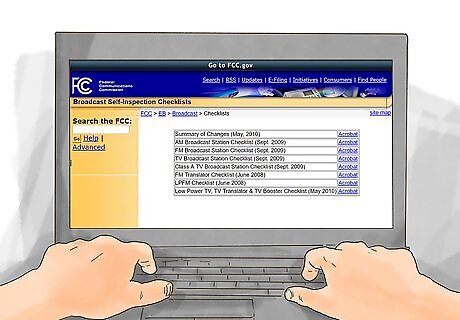
views
Finding Stations for Sale

Hire a media broker. A media broker can help you discover which properties are for sale. If you don’t use a broker, then you’ll have to rely on word of mouth or other research which could be time consuming. You can find media brokers by searching online. You might also search for a media broker at the National Association of Media Brokers website. They have a directory you can search here: http://www.nambonline.com/directory.htm. Brokers have extensive databases which they have built up over years of experience. Because their networks are so extensive, they are your best chance of finding a station. Before hiring the broker, ask how much they charge. Get quotes from several media brokers and compare.

Perform your own research. People in media might know what stations are for sale. Ask around and check whether they know of any properties on the market. Talk to radio personnel and even people who work in print or broadcast journalism. You can also perform a station search at the RadioTVDeals website. It contains listings of stations for sale.

Read the FCC rules for running a station. Before searching to buy a radio station, you should get familiar with the FCC’s rules for compliance. You have extensive responsibilities as a station owner, and you need to know them before buying a station. For example, you will need to pay for a manager and another person to cover the station when the manager is out. Complying with these rules can increase the costs of running a radio station. The FCC’s rules for AM and FM stations are available for download at the FCC website.

Choose between an AM and FM station. AM and FM refer to the way radio stations send audio signals. AM has poorer sound quality overall but can be transmitted over longer distances. AM radio is also vulnerable to sound interference and disruption by electrical storms. Consider what you hope to broadcast. Talk radio and news channels are popular on AM, while music stations are almost always FM stations.
Appraising a Station

Hire an FCC attorney. You need an FCC attorney to help you obtain a license. Consider hiring one early in the process, so that the attorney can negotiate on your behalf and draft the purchase agreement. You can find a qualified attorney in the following places: Ask station owners who they used as an attorney. You know you’ll get an experienced FCC attorney that way. Contact your local or state bar association. Ask for a referral to an FCC or communications attorney. Many communications attorneys are located in Washington, D.C. However, there should still be others located around the country.

Secure financing. Sellers want to see that a potential buyer has financing before they will begin negotiations. Line up your financing before you reach out to the seller. For example, if you intend to buy the station with a loan, then have the bank write a letter stating you have qualified. Make sure to obtain a loan through a bank that has made loans for broadcasting before. You can’t secure the loan with your FCC license, which some banks might not understand. Instead, you can secure the loan with equipment or with shares of your corporation or limited liability company (if your business is buying the station). If you are using your own money, then gather sufficient documentation to show the seller. You may need to provide personal or business financial statements.

Express interest to the seller. The seller might be handling the sale themselves or going through a broker. Your media broker can help identify the person to contact. Call them up and introduce yourself. Say you are interested in buying the station and would like more information. Make sure to get across that you are a serious buyer. If you already own other radio stations, then mention that fact. For example, you could say: “I’m Keith Johnson. I’m interested in buying your FM station in Claremont. I already own three others in the area and would like to discuss buying yours. I see it was listed for sale online.”

Sign a confidentiality agreement. Signing this confidentiality (non-disclosure) agreement is a requirement before a seller will turn over sensitive financial information. Review this agreement with your attorney before signing. If you break the agreement, the seller could pull out of the sale or potentially sue you. Make sure you understand the confidentiality agreement thoroughly before signing.

Request financial information from the seller. You need to perform intense due diligence before offering to buy a radio station. For example, you should request the following financial information and analyze it with your attorney and an accountant: Financial statements for the past two years Latest profit and loss statement for the current year Detailed list of personnel, including their job title and pay Copies of any contracts you will assume as buyer, e.g., wire service contracts, leases for land, etc. An asset depreciation schedule or complete inventory of assets

Ask for additional documents about operational history. Proper due diligence requires more than studying financial data. You should also request relevant information about the following: Make, model, and year of any transmitters and major equipment that will be included in the sale Description of all real estate involved in the sale Any information about FCC actions pending against the station, or pending lawsuits Copies of the coverage map and rate cards Copies of applications for pending facilities changes Data on the audience or copies of ratings books Information on your market (may also be available at the Chamber of Commerce) Any other information or document that might affect how you operate the station

Hire a broadcast engineer to inspect the station. An engineer who specializes in FCC compliance would be a great asset to have. This person can inspect the station’s equipment and its operations. The engineer can also analyze if upgrading the facility is feasible. You can find a qualified engineer by searching online. Also ask your lawyer, who probably has worked with a broadcast engineer before.
Purchasing the Station

Settle on a price to offer. Radio ownership might be exciting, but profits have been plunging across the industry. Discuss your offering price with your attorney, accountant, and media broker. Often, buyers offer some amount that is a multiple of the station’s cash flow. Realize that some experts recommend buying a stand-alone AM radio only at a sizeable discount, since these stations have suffered financially in recent years. By contrast, you might want to offer more for an FM station, since their profits have held up better.

Discuss the tax consequences with an accountant. Typically, you can buy a radio station using one of two methods: purchasing the station’s assets or purchasing the station’s stock. Each sale could have different tax consequences, depending on the circumstances. You should discuss tax implications with an accountant. If you purchase the stock, then you also have purchased the station’s liabilities as well. When a station has huge debts, you might be better off structuring an asset purchase. Also bear in mind that when you purchase stock, you can be held responsible for any past FCC violations. In an asset purchase, you only buy the assets you agree to. You can also assume any contracts you want, but you don’t have to assume liabilities, like debt. You will also not be financially liable for any FCC rule violations that happened before you got title to the station. Most sales are asset sales, but you should go ahead with whichever is more beneficial to you. Stock purchases might have certain tax advantages, which your accountant can explain if applicable.

Negotiate key terms with the seller. Once you have analyzed all disclosed information, you should be in a good position to begin negotiating. You will need to hammer out an agreement on several terms of the sale, such as the following: purchase price timetable for the sale what you will offer as consideration any warranties, representations, or covenants concerning the equipment and compliance with FCC regulations

Draft a letter of intent. This letter will include most of the terms of your agreement, although it is not yet binding on either you or the seller. Drafting a detailed letter of intent makes writing the final purchase agreement easier to complete. Your lawyer should draft the letter and have you sign it. Then send it to the seller requesting their signature as well. If the station is owned by shareholders, they should sign. The letter of intent is an important document, so don’t rely on a “fill in the blank” form provided by a media broker.

Obtain consent from third parties, if necessary. You might agree to buy certain contracts or agreements the seller has with a third party. In some situations, you’ll need the third party’s agreement to transfer the contracts to you. Typically, it is up to the seller to get agreement from the third party. Sometimes the third party won’t agree. To protect you, your lawyer should have included a provision in the purchase agreement to cover this situation. Often, the seller agrees to work with you to come up with a reasonable solution.
Obtaining FCC Approval

Avoid exercising control of the station. The FCC repeatedly cautions potential buyers not to exercise control of the radio station before the sale has been completed. For this reason, you should not have employees at the station on a daily basis. However, you can work around this rule in the following ways: You and the seller can sign a consulting agreement, where the seller agrees to hire you as a consultant. The seller pays you some money to make the agreement official. You buy all of the station’s broadcasting time under a Time Brokerage Agreement. You must file this agreement with the FCC.

Complete an FCC application. You must submit a long form application to the FCC and seek their approval for the transfer. You may also have to file other forms, depending on your circumstances. You will file electronically. After filing, you must wait 30 days for people to object during the public notice period. If someone does object, then you and your lawyer should talk about how to respond. Objections can lengthen the approval process several months or even years. When no objection has been made, you will typically receive your grant from the FCC within a month. However, another 30 period starts up during which people can ask the FCC to reconsider their decision to grant you a license.

Review the purchase agreement with your lawyer. You conclude the sale with a purchase agreement signed by both buyer and seller. As buyer, your lawyer typically drafts the contract and then both sides negotiate the deal. This process should start early—any time after you sign a letter of intent. The purchase agreement might change as you continue to negotiate or learn more about the station. A final, negotiated purchase agreement should contain the following: Assets you will buy. Generally, you agree to buy “all tangible and intangible assets” and then exclude any assets you don’t want. You can also include a schedule to the agreement which lists in detail the assets you are buying. Purchase price. You should also explain how you will make the purchase at closing. Amount of earnest money deposited in escrow. Earnest money is the sum you give the seller to show you are serious. If you back out of the purchase, the seller often gets to keep this sum. Earnest money usually totals 5-10% of the purchase price. Liabilities or obligations you are assuming. Generally, you assume contracts, leases, and agreements. They can be spelled out in detail in a schedule. Date, time, and location of the closing. Representations and warranties. These are meant to protect you from surprises after the purchase. For example, the seller will warrant that it is in compliance with the FCC. When a warranty or representation is false, you can usually void the contract or sue. Conditions to buyer’s and seller’s obligation to close. Before a contract is valid, all conditions must be met. For example, you will want FCC approval as a condition to the sale. If the FCC denies the transfer, then you have no obligation to go ahead with the contract because the condition hasn’t been met. Process for terminating the agreement. A section should explain how either side can terminate the contract and any remedies if one side breaks the agreement without legal grounds for doing so.

Schedule a closing. You can’t complete the sale until the FCC agrees to the transfer. Most closings happen at a lawyer’s office or at a local abstract office. Also FCC attorneys might handle the closing over the phone. Prepare for the closing by drafting checklists of all documents that must be prepared and signed. Appoint the seller or buyer certain tasks. Using checklists will make the closing go smoother. You should plan on attending. If your lawyer needs your input, then you are conveniently present to answer any questions.




















Comments
0 comment